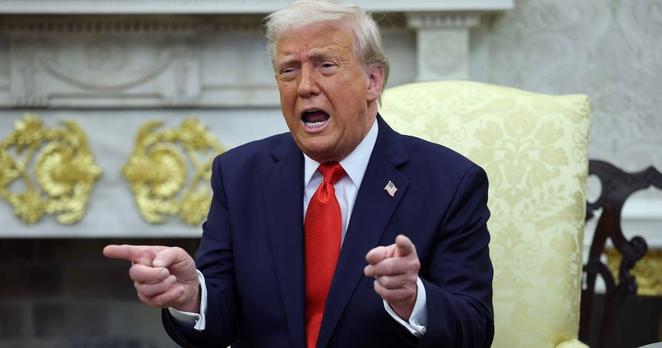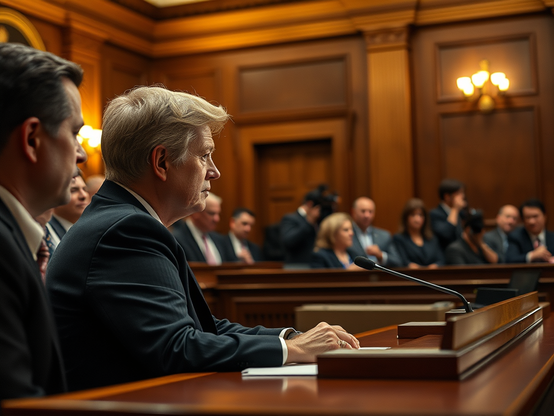The New Yorker Daily Newsletter – October 10, 2025
Source: https://www.newyorker.com/
Jon Allsop
A contributing writer who covers politics.
Yesterday, April M. Perry, a federal judge, barred the Trump Administration from deploying the National Guard in Illinois, for at least the next fourteen days. “I have seen no credible evidence that there is danger of rebellion in the state,” Perry noted from the bench. J. B. Pritzker, the governor of Illinois, who had been resisting the deployments to Chicago (and who Trump said this week “should be in jail”), celebrated the ruling on social media, writing, “Donald Trump is not a king—and his administration is not above the law.”
President Trump’s dispatching of military personnel to American cities—including Portland, Oregon, where litigation is also pending—could be described in many such authoritarian-esque terms. Certainly, “popular” does not appear to be one of them. Earlier this week, CNN’s Aaron Blake pointed out that clear majorities among the public seem to be against the practice: a recent poll from Quinnipiac University found that fifty-five per cent of respondents disapproved of the deployment of the National Guard, compared with forty-two per cent who approved; on Sunday, CBS News/YouGov reported an even higher rate of disapproval, and the same rate of support—forty-two per cent.
The late science-fiction author Douglas Adams once posited that the number forty-two was the answer to the ultimate question of “life, the universe and everything.” It might, at least, be the answer to the question, How popular is Donald Trump? The aforementioned CBS News/YouGov poll also pegged Trump’s over-all approval rating at forty-two per cent, and several polling averages put him either at that figure, or a point or so to either side. This past Monday night, Jimmy Kimmel, a recent subject of Trump’s ire, crowed that, per another poll, he is more popular than the President. “At this point, finding a toenail in your salad has a seven-point lead over Donald Trump,” Kimmel said.
Trump obviously isn’t buying these figures. On Sunday, he accused Fox News of refusing “to put up Polls that correctly show me at 65% in Popularity, a Republican RECORD.” Whatever he actually thinks, he is behaving as if it’s correct, which is no surprise. What might be surprising is that so many ostensibly powerful people—G.O.P. leadership in Congress, heads of major corporations—seem so eager to accede to the imperial demands of a President who is not racking up imperial numbers.
I have a few theories about why they are bowing to Trump. First, America’s political divides appear so entrenched that when support for a single person or policy manages to break through, it creates a narrative boost that is disproportionate to actual support. Trump could still be bathing in the glow of his election win last year, even though he did not quite get fifty per cent of the popular vote and his approval rating since taking office has steadily declined.
At the same time, if you’re a corporation or university or media outlet considering bowing to one of Trump’s demands, it’s a safe-ish bet that the cost will not be universal public disapprobation. Plus, Trump is the President now, wielding that office in expansively transactional ways: G.O.P. lawmakers clearly do not want to get on his bad side; corporations—especially those with pending regulatory business before the Administration—have reason to be on his good side. Some corporations, in particular, may be taking advantage of this moment to pursue changes they wanted to make anyway—curbing costly diversity initiatives, for example, or disowning thorny content-moderation responsibilities. (Both this and the regulatory angle are potential explanations for CBS News putting Bari Weiss in charge, which I wrote about earlier this week.)
The bleakest theory is that major civil-society actors are betting that the power of Trump’s populism is untethered from his actual popularity, given his anti-democratic impulses and his win-at-all-costs mentality—that, in effect, Trump is no longer accountable to the public. But I don’t think this is true. As Jonathan Schlefer wrote for Politico last month, populist leaders in recent decades who have succeeded in undoing relatively strong democracies had approval ratings above eighty per cent—much higher, even, than the figure Trump accused Fox of suppressing. And the President’s imperial conduct isn’t omnipotent; Kimmel, of course, is still on the air.
Even if Trump’s approval rating were eighty per cent, that wouldn’t justify his authoritarian behavior; the Constitution guarantees minority rights for a reason. Flattering Trump, or caving to his demands, may be a savvy short-term bet, but I’m not sure it’ll prove smart in the long run. On Wednesday, CNN’s Blake noted what he described as “the most underappreciated aspect” of the National Guard story: that most Americans seem to oppose deployments not just as a waste of time and resources but on principle. He pointed to a question from a Times/Siena survey, which asked respondents if they were more worried about crime spiralling out of control in the absence of the Guard, or about Trump using troops to intimidate his political opponents. Concern over abuses of power prevailed: fifty-one to—you guessed it—forty-two per cent.
Continue/Read Original Article Here: The New Yorker Daily Newsletter
#100 #2025 #America #AprilPerry #Barred #Chicago #DonaldTrump #Education #FederalJudge #History #Illinois #IllinoisGovernor #JBPritzker #Libraries #Library #LibraryOfCongress #NationalGuard #NoKings #NotAboveTheLaw #Opinion #Politics #Resistance #Science #TheNewYorker #Trump #TrumpAdministration #UnitedStates



